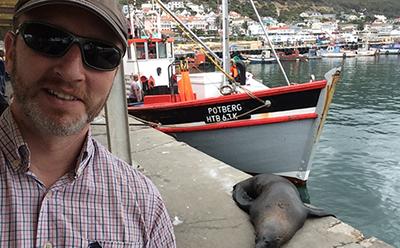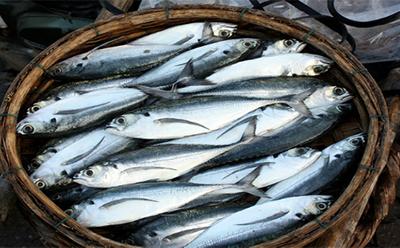
Read more on the evidence informed policy making
Learn more from Dr Sally Brown about how we can use science to understand coastal policy in the National Trust

With Brexit the UK will leave the Common Fisheries Policy, which has provided the framework for governing shared marine fisheries in European waters for nearly 50 years. In leaving the EU, the UK Government needs to develop new policies for the management, exploitation and conservation of marine fisheries, and as part of this process has produced a Fisheries White Paper providing proposals that are open to public consultation until 12 September. While the UK marine fisheries may be considered to be a relatively small contributor to the UK economy when compared with other sectors, representing only 0.05% of our GDP (NEF 2014), future policy on fisheries has much farther reaching implications than one might expect when viewed from the perspective of food security. Certainly, the importance extends far beyond immediate media interests in skirmishes between English and French scallop fishermen off the coast of Normandy, and vocal arguments presented by representatives of fishing communities about fair shares. Here I provide some of my thoughts on the Fisheries White Paper and highlight a need to take a step back and reconsider the science that underpins todays fisheries management strategies while looking to the needs of a nation that in the future will increasingly suffer the vagaries of shifting trade relationships in an era of potential global food shortages.
Our fisheries can be viewed from two viewpoints; on one hand a human perspective, considered usually in terms of the economy, culture and history of fishing communities that the resource supports (wider society is of course also a stakeholder as our fisheries are a publicly owned asset, but this point is less often considered in the public debate). The other side represents the fish populations themselves, influenced by a multitude of factors, such as predation, climate driven changes in oceanic productivity, and harvest. In a large part, the Fisheries White Paper focuses predominantly on the interests of fisheries communities, considering how they may achieve a “fairer deal” in terms of resource allocation (quota) after the UK leaves the EU. Although sustainability of fisheries management is mentioned multiple times, there is less focus on this side of the coin, with the implication that practices and policy will continue along a track of “business as usual” by assigning Total Allowable Catches (TACs) based on calculations of Maximum Sustainable Yield (MSY), and Fixed Quota Allocations, largely because fishermen have invested in this system (as opposed to being based on best available science). This is a serious omission; leaving the EU represents not only an opportunity to renegotiate allocation of a harvested resource, but also to take a step back and re-evaluate current fisheries management science, practice, and policy. To do so requires consideration and honest acknowledgement of the current status of marine fisheries resources within the context of our past and potential future.
Despite modest (when viewed from a historic perspective) increases in some fish stocks (e.g. cod) over very recent times, our fisheries resources remain in a degraded and precarious state. This was highlighted in 2004, when the Royal Commission on Environmental Pollution advised significant and urgent action was needed to avoid fisheries collapse. Today, according to the European Environment Agency (2018), approximately 74% of the assessed fish and shellfish stocks in Europe’s seas are not in Good Environmental Status (a measure designed to be based on level of fishing mortality, reproductive capacity, and age and size structure of the populations) defined under EU’s Marine Strategy Framework Directive. Indeed, based on the analysis of 57 stocks for which data was available as of 2015 (Source: CEFAS and ICES) the percentage of fish stocks of direct interest to the UK economy fished at or below levels capable of producing MSY was only 53%. Furthermore, when focusing on specific stocks and environments, the situation becomes even more critical. Considering deep-sea species, in 2013 it was estimated that 62% of Northeast Atlantic stocks were fully exploited and 31% overexploited (WOR 2013). The eminent fisheries scientist, Boris Worm, describes this situation that mirrors the overall global status of fisheries succinctly in economic terms; if fish stocks were financial assets, most would represent a poor choice for investors (Worm 2016). It is important to recognise that recovery targets reflect only fractions of levels that were attained historically (see The Unnatural History of the Sea, Professor Callum Roberts, University of York), and that may potentially be achieved in the future. The reality is that when viewed from the perspective of predicted risk of future world food shortages in 2050 (FAO 2011), healthy and resilient marine fisheries resources will be critical, not only to local fishing communities, but to overall UK food security. Our situation is similar to others around the world in that the future of fisheries is tenuous, unless comprehensive reform becomes a unifying focus for fisheries management (Worm 2016). It is essential, therefore, to independently review the science base that underpins our current fisheries management policy and practices and investigate whether these reflect the most appropriate strategies to ensure rapid stock recovery and increased future resilience.
An independent review of fisheries management science, policy and practices should be conducted for two reasons: 1) to ensure that the proposed “business as usual” model based on MSY is fit for purpose; 2) to limit concerns raised in relation to independence of the scientific advice provided by government funded agencies on which policy is based. The first is important considering the concerns raised over the validity of using MSY over recent years. Several prominent authors (including the grandfather of stock assessment methodologies in the UK - Dr Sidney Holt: see his 2011 blog entitled, “Maximum Sustainable Yield: The Worst Idea in Fisheries Management”) have highlighted problems associated with MSY. According to Holt (2011), “MSY both enthrones and institutionalizes greed. It is a perfect example of pseudo-science with little empirical or sound theoretical basis. As a target for management of fisheries, or even as the anchor for so-called ‘reference points’, it is inadequate and its pursuit increases the likely unprofitability, and even collapse, of fisheries”. Likewise, in an article entitled, “Maximum sustained yield: a policy disguised as science”, Finley and Oreskes (2013) are equally as critical. They argue that fisheries science, and particularly the concept of MSY, has been used as a political tool to achieve foreign policy objectives. Indeed, in the 1950s the then untested (from the perspective of managing fish stocks) principle of MSY was employed by the US as a means to justify that the fisheries off their coasts were “fully utilised” and thus other states should refrain from engaging in them (referred to as the Abstention Principle) in post-war negotiations related to a convention for the management of North Pacific Fisheries with the Japanese (Holt 2013). This was an attempt to protect salmon from capture by Japanese vessels at sea. Finley and Oreskes (2013) argue that MSY was also used by the US State Department as a political tool to control passage of military vessels during the Cold War era. The use of fisheries science as a means to achieve wider policy objectives, rather than for the sole purpose of assigning quota that enables rapid stock recovery, is an activity we should strive to prevent from happening today or in the future.

From a scientific perspective, just as the Fisheries White Paper argues that the Common Fisheries Policy’s principle of “relative stability”, in which the UK receives a fixed share of fishing opportunities based on historic fishing patterns dating back to between 1973 and 1978, is inappropriate when considering conditions that prevail today, we may equally question the validity of applying a methodology (MSY) developed in the 1930s (by Norwegian Scientists - Hjort, Ottestad and Jahn 1933) in relation to whales (several species of which nearly went extinct in the 1970s) to the current fisheries context. While fisheries science has undoubtedly moved on, there is a need to re-evaluate current policy to assess whether or not it has kept pace. Indeed, there are a wide diversity of fisheries management systems employed around the world, and those that focus on investing in limiting fishing pressure backed by comprehensive enforcement programmes, as opposed to enhancing fishing capacity, are more likely to have stocks trending to more desirable status (Melnychuk et al. 2017). The Fisheries White Paper argues for continuation of an efficient (but sustainable) fisheries industry; but we may need to implement programmes that deliberately add inefficiency into the system (e.g. mesh size and shape, limits to engine power and on-board technology) to genuinely enhance sustainability. Recent analysis (Costello et al. 2016) of global fisheries management systems indicate that current management systems not only threaten the future of food security, but also make little economic sense. In their analysis, if fisheries are successfully managed to sustain maximum catch (MSY) over the long-term, which is most close to the current UK policy, then at best only a slow recovery of the stock could be expected. Models of alternative systems, such as one that attempts to optimise long-term profits, instead of catch, performed considerably better (under their analysis the sum of total biomass more than doubled across all stocks, while profits more than tripled compared to a business as usual model). In the face of this and other scientific evidence, it would be prudent to review the long term plan and mechanisms by which we manage UK fisheries so that we have the best possible chance of enhancing the future of our fishing communities and national food security through recovering resilient fish populations. This may mean allowing stocks to recover to levels that are much higher than those that can produce MSY in preparation of meeting urgent future demand scenarios in which trade relationships break down in the face of world food shortages. It is critical that such a review is, and is seen to be, independent.
The Fisheries White Paper refers to reviews to be conducted by Defra, e.g. in relation to how fishing opportunities will be managed in England. However, the issue of independence is an important one. Although executive agencies have provided important scientific advice on which fisheries policy has been based for decades, and no doubt host some of the worlds’ most outstanding fisheries scientists, accusations have been implied in the popular literature relating to the failed management of marine fisheries that as organisations they may be in danger of being overly bureaucratic and potentially biased by government agendas (e.g. see End of the Line by Charles Clover, Blue Marine Foundation). Whether such assertions are true or not, the perception that they might be is problematic. Reference in the Fisheries White Paper to “Partnership Working” (section 4 and Annex D) highlights the involvement of a range of stakeholders in the development of current thinking, including the wider academic community. This is much welcomed (although academics are not mentioned in the section on collecting best scientific data), but more detail is needed. A review of fisheries science, policy and practice should be conducted with an appropriate structure to clearly emphasise independence with input from world leading international experts so that the most appropriate pathway to sustainable fisheries management for the future UK context can be identified.
The Fisheries White Paper refers to progress in creating a “blue belt” of Marine Protected Areas (MPAs) around the UK coast. Based on years of research, the establishment of MPAs is considered to be one of the most cost-effective ways to restore overexploited stocks and habitats on which fish depend (to the benefit of the fishing industry in terms of increased catches outside of the source areas), but also can result in other benefits including mitigation and adaptation to climate change through a range of mechanisms (Roberts et al. 2017). Unfortunately, several concerns regarding the UKs progress in developing this network of MPAs and how their protection is enforced have been highlighted in the national media. While the Fisheries White Paper highlights successful designation of 50 sites, representing 20,000 km2 of English Waters, as Marine Conservation Zones (MCSs), this falls short of the 127 sites proposed in an earlier government consultation. Furthermore, leading fisheries scientists suggest that such designation is meaningless because there is insufficient enforcement of their protected status, leading them to be described as “worse than useless paper parks” because they give the illusion of protection when none exists (see interview with Professor Callum Roberts on BBC Radio 4’s The Life Scientific). Such perceptions are widely held and damaging; they should be addressed with more concrete proposals on enforcement developed and incorporated to give future government policy sufficient credibility. The current Fisheries White Paper has more work to do in supplying addition information related to this element.
My final observation regarding the White Paper is its biased focus on the marine environment. Of course, this would appear to be obvious when considering its purpose is to provide the basis for a replacement of the Common Fisheries Policy related to management of marine fisheries. However, from an ecological perspective such a narrow scope is illogical. Estuaries that represent the transitional zone between freshwater and marine ecosystems are critically important for a vast number of marine animals that reproduce there and use them as nursery habitats during the early stages of their life-cycle. In the United States, for example, estuaries provide habitat for fish that represent approximately 68% of the value of the national commercial catch, and 80% of the recreational catch in terms of weight (Lellis-Dibble et al. 2008). Furthermore, some of our most important species (e.g. salmon, sea trout, eel, and in the time of Henry I, lamprey) when viewed from economic, cultural, and conservation perspectives are diadromous; that is, they migrate between the freshwater and marine environments to complete their life-cycle. While the Fisheries White Paper recognises the value of adopting an ecosystem based approach to fisheries management (as set out in Defra’s 25 Year Environment Plan), there is also a need to consider the management of fisheries and protecting populations throughout their life-cycle. To do this a holistic approach to developing policy and enacting legislation is needed. Indeed, this was recognised when the suitability of including regulatory issues concerning inland waters was considered in the development of the Marine Bill, while the importance of the connectivity between freshwater and coastal habitats has been recognised in the Water Framework Directive. Likewise, existing legislation that protects some species (such as salmon and migratory trout) in the freshwater environment also considers their protection in coastal waters, out to a six mile limit. Such legislation deals with only a limited number of species, however, and there has been an intention to widen some acts (such as the Salmon and Freshwater Fisheries Act 1975) so that a greater proportion of the community is included. Today, it appears though that such efforts have stalled, at least temporarily, and the current intensive resource needed to ensure a smooth and timely Brexit process, and implications for parliamentary time, likely mean there will be little appetite for primary legislation in this area any time soon. Nevertheless, the need for joined up legislation to underpin ecologically based fisheries management will be essential if efficient and sustainable systems are to be implemented and enforced to allow stocks to recover to levels that will help ensure UK food security in the future. Thus, the current Fisheries White Paper could provide an opportunity to consider modernising all fisheries legislation in a coherent way; an opportunity that we should grab with both hands if we can.
Paul Kemp, Professor of Fisheries Management and Chair of the University of Southampton Strategic Research Group in Nexus Science
References:
Clover, C. Year. 2004. The end of the line: how overfishing is changing the world and what we eat. Ebury Press (UK) and New Press (US).
Costello, C., Ovando, D., Clavelle, T., Strauss, C.K., Hilborn, R., Melnychuk, M.C., Branch, T.A., Gaines, S.D., Szuwalski, C.S., Cabral, R.B., Rader, D.N. and Leland, A. 2016. Global fishery prospects under contrasting management regimes. PNAS 113 (18), 5125-5129. https://doi.org/10.1073/pnas.1520420113
European Environment Agency 2018. Status of marine fish and shellfish in European seas. https://www.eea.europa.eu/data-and-maps/indicators/status-of-marine-fish-stocks-3/assessment (accessed 6 September 2018).
FAO 2011. The state of the world’s land and water resources for food and agriculture (SOLAW) – Managing systems at risk. Food and Agriculture Organization of the United Nations, Rome and Earthscan, London.
Finley, C. and Oreskes, N. 2013. Maximum sustained yield: a policy disguised as science. ICES Journal of Marine Science 70, 245–250.
Holt, S. 2011. Maximum Sustainable Yield: The Worst Idea in Fisheries Management. Blog for Breaching the Blue.com. https://breachingtheblue.com/2011/10/03/maximum-sustainable-yield-the-worst-idea-in-fisheries-management/ (accessed 6 September 2018).
Hjort, J., Jahn, G. and Ottestad, P. 1933. The optimum catch. Hvalradets Skrifter 7, 92-107.
Lellis-Dibble, K.A., McGlynn, K.E. and Bigford, T.E. 2008. Estuarine fish and shellfish species in US. Commercial and recreational fisheries: economic value as an incentive to protect and restore estuarine habitat. http://sp.nmfs.noaa.gov/tm/TM90.pdf
Melnychuk, M.C., Peterson, E., Elliott, M. and Hilborn, R. 2017. Fisheries management impacts on target species status. PNAS 114 (1),178-183. https://doi.org/10.1073/pnas.1609915114
NEF 2014. New Economics Foundation – How important is fishing to the UK economy? The Marine Socio-Economics Project (MSEP) Facts And Figures Series 1.
Roberts, C.M. 2007. The unnatural history of the sea: the past and future of humanity and fishing. Gaia Books Ltd.
Roberts, C.M., O’Leary, B.C., McCauley, D.J., Cury, P.M., Duarte, C.M., Lubchenco, J., Pauly, D., Sáenz-Arroyo, A., Sumaila, U.R., Wilson, R.W., Worm, B. and Castilla, J.C. 2017. Marine reserves can mitigate and promote adaptation to climate change. PNAS 114 (24), 6167-6175. https://doi.org/10.1073/pnas.1701262114
WOR 2013. World Ocean Review - Fisheries 2013 https://worldoceanreview.com/en/wor-2/fisheries/ (accessed 6 September 2018).
Worm, B. 2016. Averting a global fisheries disaster. PNAS 113 (18) 4895-4897. https://doi.org/10.1073/pnas.1604008113

Learn more from Dr Sally Brown about how we can use science to understand coastal policy in the National Trust

Catch up with past articles from researchers at the University of Southampton